 W
WSwami Abhedananda, born Kaliprasad Chandra was a direct disciple of the 19th century mystic Ramakrishna Paramahansa and the founder of Ramakrishna Vedanta Math. Swami Vivekananda sent him to the West to head the Vedanta Society of New York in 1897, and spread the message of Vedanta, a theme on which he authored several books through his life, and subsequently founded the Ramakrishna Vedanta Math, in Calcutta and Darjeeling.
 W
WMaraimalai Adigal was a Tamil orator and writer and father of Pure Tamil movement. He was a fervent Saivite Hindu. He wrote more than 100 books, including works on original poems tand dramas, but most famous are his books on his research into Tamil literature. Most of his literary works were on Saivism. He founded a Saivite institution called Podhunilaik Kazhagam. He was an exponent of the Pure Tamil movement and hence considered to be the father of Tamil linguistic purism. He advocated the use of Tamil devoid of Sanskrit words and hence changed his birth name Vedhachalam to Maraimalai.
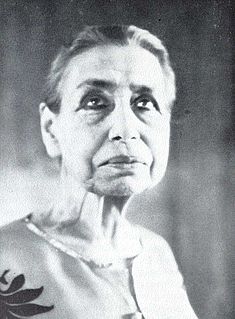 W
WMirra Alfassa, known to her followers as The Mother, was a spiritual guru, an occultist and a collaborator of Sri Aurobindo, who considered her to be of equal yogic stature to him and called her by the name "The Mother". She founded the Sri Aurobindo Ashram and established Auroville as a universal town; she was an influence and inspiration to many writers and spiritual personalities on the subject of Integral Yoga.
 W
WVishnu Raj Atreya was a Nepali writer and poet, who wrote in Nepali language, Sanskrit language and Awadhi language. He used the title Latosaathi in his poetry works since 1963 A.D. He is considered to be the first person to start writing Haiku in Sanskrit language.
 W
WSri Aurobindo was an Indian philosopher, yogi, guru, poet, and nationalist. He joined the Indian movement for independence from British rule, for a while was one of its influential leaders and then became a spiritual reformer, introducing his visions on human progress and spiritual evolution.
 W
WBhakti Hridaya Bon, also known as Swami Bon was a disciple of Bhaktisiddhanta Sarasvati Thakura and a guru in the Gaudiya Math following the philosophy of the Bhakti marg, specifically of Caitanya Mahaprabhu and Gaudiya Vaishnava theology. At the time of his death, he left behind thousands of Bengali disciples in India.
 W
WChaitanya Chandra Charan Das is a Krishna religious figure and preacher; guru and member of the Governing Council of the International Society for Krishna Consciousness (ISKCON).
 W
WChidananda Saraswati was President of the Divine Life Society, Rishikesh, India. He is well known in India as a yogi, dnyani and spiritual leader. He succeeded as President of the Divine Life Society in 1963, after the death of his predecessor, Sivananda Saraswati, who founded the Society.
 W
WAnanda Kentish Muthu Coomaraswamy was a Ceylonese Tamil metaphysician, pioneering historian and philosopher of Indian art who was an early interpreter of Indian culture to the West. In particular, he is described as "the groundbreaking theorist who was largely responsible for introducing ancient Indian art to the West."
 W
WBaba Hari Dass, born in Almora near Nainital, Uttar Pradesh, India, was a yoga master, a silent monk, and a commentator of Indian scriptural tradition of Dharma and Moksha. He was classically trained in Ashtanga Yoga – Raja Yoga of Patanjali, as well as Kriya Yoga, Ayurveda, Samkhya, Tantra Yoga, Vedanta, and Sanskrit.
 W
WDayananda Saraswati was an Indian philosopher, social leader and founder of the Arya Samaj, a reform movement of the Vedic dharma. He was the first to give the call for Swaraj as "India for Indians" in 1876, a call later taken up by Lokmanya Tilak. Denouncing the idolatry and ritualistic worship prevalent in India at the time, he worked towards reviving Vedic ideologies. Subsequently, the philosopher and President of India, S. Radhakrishnan called him one of the "makers of Modern India", as did Sri Aurobindo.
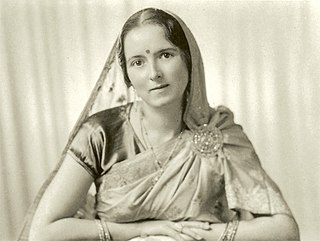 W
WSavitri Devi Mukherji was a French-born proponent of Nazism who served the Axis powers by committing espionage on the forces of the Allies of World War II in India. She was later a leading member of the Nazi underground during the 1960s.
 W
WKrishna Dharma born as Kenneth Anderson is a British Hindu scholar and author.
 W
WBhupendranath Datta was an Indian revolutionary and later a noted sociologist and anthropologist. He associated Rishi Aurobindo in his political works. In his youth, he was closely associated with the Jugantar movement, serving as the editor of Jugantar Patrika till his arrest and imprisonment in 1907. In his later revolutionary career, he was privy to the Indo-German Conspiracy. His elder brother was Swami Vivekananda. The Asiatic Society today holds the Dr. Bhupendranath Datta memorial lecture in his honour.
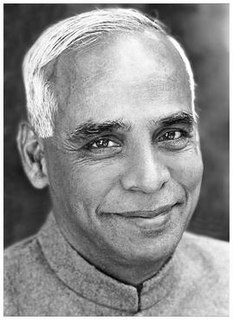 W
WEknath Easwaran was an Indian-born spiritual teacher, author, as well as a translator and interpreter of Indian religious texts such as the Bhagavad Gita and the Upanishads.
 W
WThunchaththu Ramanujan Ezhuthachan was a Malayalam devotional poet, translator and linguist from Kerala, south India. He has been called the "Father of Modern Malayalam", or, alternatively, the "Father of Malayalam Literature", or the "Primal Poet in Malayalam". He was one of pioneers of a major shift in Kerala literary production. The number and circulation of his texts far outdo that of any other poet of premodern Kerala.
 W
WMehr Lal Soni, better known as Zia Fatehabadi, was an Indian Urdu ghazal and nazm writer. He was a disciple (shaagird) of Syed Aashiq Hussain Siddiqui Seemab Akbarabadi (1882–1951), who was a disciple of Nawab Mirza Khan Daagh Dehlvi (1831-1905). He used the takhallus of Zia meaning "Light" on the suggestion of his teacher, Ghulaam Qadir Farkh Amritsari.
 W
WDavid Frawley is an American Hindu teacher (acharya) and a Hindutva author.
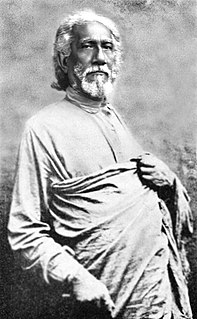 W
WSri Yukteswar Giri is the monastic name of Priya Nath Karar, an Indian monk and yogi, and the guru of Paramahansa Yogananda and Swami Satyananda Giri. Born in Serampore, West Bengal, Sri Yukteswar was a Kriya yogi, a Jyotisha, a scholar of the Bhagavad Gita and the Upanishads, an educator, author, and astronomer. He was a disciple of Lahiri Mahasaya of Varanasi and a member of the Giri branch of the Swami order. As a guru, he had two ashrams, one in Serampore and another in Puri, Odisha, between which he alternated his residence throughout the year as he trained disciples.
 W
WSatsvarupa das Goswami is a senior disciple of Bhaktivedanta Swami, who founded the International Society for Krishna Consciousness (ISKCON), better known in the West as the Hare Krishna movement. Serving as a writer, poet, and artist, Satsvarupa dasa Goswami is the author of Bhaktivedanta Swami's authorized biography,Srila Prabhupada-lilamrta. After His Divine Grace A. C. Bhaktivedanta Swami Prabhupada's death, Satsvarupa dasa Goswami was one of the eleven disciples selected to become a priest to initiate future disciples on His Divine Grace’s behalf in ISKCON through proxy, although this order was later abandoned with no justification. Satsvarupa dasa Goswami,, is one of the first few Westerners ordained by Bhaktivedanta Swami in September 1966. He has been since established as a prolific Vaishnava writer and poet. While traveling, lecturing on Krishna consciousness, and instructing disciples worldwide, he published over hundred books including poems, memoirs, essays, novels, and studies based on the Vaishnava scriptures. In his later years he created hundreds of paintings, drawings, and sculptures that attempt to capture and express his perspective on the culture of Krishna consciousness.
 W
WHariharananda Giri, was an Indian yogi and guru who taught in India as well as in western countries. He was born Rabindranath Bhattacharya in Nadia district, West Bengal. He was the head of the Kriya Yoga Institute, United States. According to the Times of India, Hariharananda was a direct disciple of Yukteswar Giri.
 W
WJaimini was an ancient Indian scholar who founded the Mīmāṃsā school of Hindu philosophy. He was a disciple of sage Veda Vyasa, the son of Parashara. Traditionally attributed to be the author of the Mimamsa Sutras and Jaimini Sutras, he is estimated to have lived around the 4th-century BCE. His school is considered non-theistic, but one that emphasized rituals parts of the Vedas as essential to Dharma.
 W
WKrishna Dasa Kaviraja Goswami was the author of the Chaitanya Charitamrita, a biography on the life of the mystic and saint Chaitanya Mahaprabhu (1486–1533), who is considered by the Gaudiya Vaishnava school of Hinduism to be an incarnation of Radha and Krishna combined.
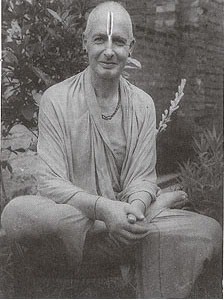 W
WRonald Henry Nixon, later known as Sri Krishna Prem or Sri Krishnaprem, was a British spiritual aspirant who went to India in the early 20th century. Together with his spiritual teacher Sri Yashoda Mai (1882-1944), he founded an ashram at Mirtola, near Almora, India. He was one of the first Europeans to pursue orthodox Vaishnavite Hinduism. Remaining a strict Gaudiya Vaishnavite the rest of his life, he was highly regarded, and had many Indian disciples.
 W
WRajiv Malhotra is an Indian-born American author who, after a career in the computer and telecom industries, took early retirement in 1995 to set up the Infinity Foundation, which focuses on Indic studies, and also funds projects such as Columbia University's project to translate the Tibetan Buddhist Tengyur.
 W
WDurga Charan Mohanty (Odia:ଦୁର୍ଗାଚରଣ ମହାନ୍ତି, was an Odia Indian spiritual writer born in 1912 at Biratunga, a village under block Gop, near Konark, Odisha. The Odia Sahitya Akademi has been awarded to him in 1956–58 due to his active involvement in development of Odia language and literature Being a disciple of Swami Nigamananda, he wrote many books and translated Nigamananda's own-written Bengali books to Odia language. He was ପରିଚାଳକ of ନୀଳାଚଳ ସାରସ୍ୱତ ସଂଘ.
 W
WMukunda Goswami is a spiritual leader (guru) within the International Society for Krishna Consciousness.
 W
WSwami Nigamananda Paramahansa is a Sadguru,yogi, guru and mystic well known in Eastern India. He is associated with the Shakta tradition and viewed as a perfect spiritual master of tantra, gyan, yoga and prema or bhakti. His followers idealized him as their worshipped and beloved thakura.
 W
WSister Nivedita was an Irish teacher, author, social activist, school founder and disciple of Swami Vivekananda. She spent her childhood and early youth in Ireland. She was engaged to marry a Welsh youth, but he died soon after their engagement.
 W
WSwami Prabhavananda was an Indian philosopher, monk of the Ramakrishna Order, and religious teacher. He moved to America in 1923, founded the Vedanta Society of Southern California in 1930, and spent the rest of his life there.
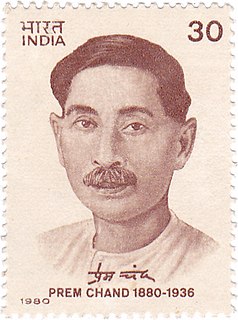 W
WDhanpat Rai Srivastava, better known by his pen name Munshi Premchand (pronounced [mʊnʃiː preːm t͡ʃənd̪] , was an Indian writer famous for his modern Hindustani literature. He is one of the most celebrated writers of the Indian subcontinent, and is regarded as one of the foremost Hindi writers of the early twentieth century. His novels include Godaan, Karmabhoomi, Gaban, Mansarovar, Idgah. He published his first collection of five short stories in 1907 in a book called Soz-e Watan.
 W
WRanchor Prime is a British author, researcher on Hindu environmental issues, and a Hindu religious scholar. Ranchor Prime is best known for his books on Hinduism and ecology. He is a disciple of A. C. Bhaktivedanta Swami Prabhupada. Ranchor Prime has translated the Bhagavad Gita into English. It was published with illustrations by B. G. Sharma as The Illustrated Bhagavad Gita: A New Translation with Commentary.
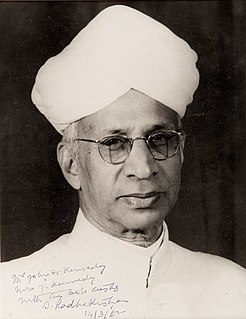 W
WSarvepalli Radhakrishnan pronunciation (help·info) was an Indian philosopher, academic, and statesman who served as the first Vice President of India (1952–1962) and the second President of India (1962–1967).
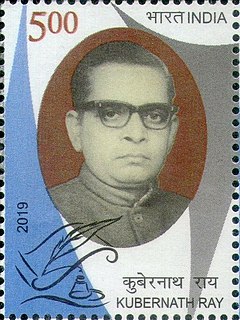 W
WKuber Nath Rai, also written as Kubernath Ray and Kuber Nath Ray, was a writer and scholar of Hindi literature and Sanskrit.
 W
WRam Dass, also known as Baba Ram Dass, was an American spiritual teacher, psychologist, and author. His best known book, Be Here Now (1971), has been described as "seminal", and helped popularize Eastern spirituality and yoga with the baby boomer generation in the West. He authored or co-authored twelve more books on spirituality over the next four decades, including Grist for the Mill (1977), How Can I Help? (1985), and Polishing the Mirror (2013).
 W
WRamchandra Dattatray Ranade (1886–1957) was a Indian scholar-philosopher-saint of Karnataka and Maharashtra.
 W
WPhanishwar Nath 'Renu' was one of the most successful and influential writers of modern Hindi literature in the post-Premchand era. He is the author of Maila Anchal, which after Premchand's Godaan, is regarded as the most significant Hindi novel. Phanishwar Nath (Mandal) Renu was born on 4 March 1921 in a small village Aurahi Hingna near Simraha railway station in Bihar. The Mandal (surname) community to which Renu belonged constitutes an under-privileged social group in India. Renu's family, however, enjoyed the benefits of land, education, and social prestige. Renu's father, Shilanath Mandal, had been active in the Indian National Movement and was an extremely enlightened individual, taking a keen interest in modern ideas, culture and art.
 W
WSteven J. Rosen, also known as Satyaraja Dasa, is an American author. He is the founding editor of The Journal of Vaishnava Studies and an associate editor of Back to Godhead, the magazine of the Hare Krishna movement. He has authored more than 30 books on Vaishnavism and related subjects, including Black Lotus: The Spiritual Journey of an Urban Mystic (2007), which is the life story of Bhakti Tirtha Swami.
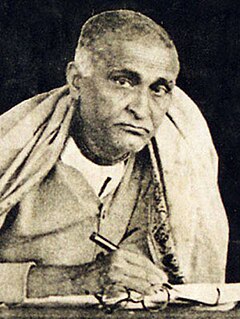 W
WBhaktisiddhanta Sarasvati, born Bimla Prasad Datt, was a Gaudīya Vaisnava Hindu guru, ācārya, and revivalist in early 20th century eastern India. To his followers, he was known as (Srila) Prabhupāda.
 W
WSwami Dayananda Saraswati was a renunciate of the Hindu order of sannyasa and a renowned traditional teacher of Advaita Vedanta, and founder of the Arsha Vidya Gurukulam. He was the spiritual Guru of prime minister Narendra Modi.
 W
WArvind Sharma is the Birks Professor of Comparative Religion at McGill University. Sharma's works focus on Hinduism, philosophy of religion. In editing books his works include Our Religions and Women in World Religions, Feminism in World Religions was selected as a Choaphy ChoiceOutstanding Academic Book (1999).
 W
WSwami Shraddhanand, also known as Mahatma Munshi Ram Vij, was an Indian Independence activist and an Arya Samaj sannyasi who propagated the teachings of Dayananda Saraswati. This included the establishment of educational institutions, like the Gurukul Kangri University, and played a key role on the Sangathan and the Shuddhi (re-conversion), a Hindu reform movement in the 1920s.
 W
WAseem Ravindra Shukla is the Director of Minimally Invasive Surgery in the Department of Urology at the Children's Hospital of Philadelphia, PA and is a Professor of Surgery (Urology) at the Perelman School of Medicine at the University of Pennsylvania. Shukla is the co-founder and board member of the Hindu American Foundation.
 W
WKaran Singh is an Indian politician, philanthropist and poet. He belongs to Jamwal Dogra Dynasty is the son of Maharaja Hari Singh, and was born in Cannes, France. From 1947 he worked closely, as a teenager, with Jawaharlal Nehru, and Sardar Patel during the founding of the Republic of India, and in 1967 became the youngest ever union cabinet minister in the government of Indira Gandhi. He was the Prince regent of Jammu and Kashmir till 1952. Following which at age 21 years old, Karan Singh served as the first President of Jammu and Kashmir from 1952 to 1965.
 W
WSivananda Saraswati was a Hindu spiritual teacher and a proponent of Yoga and Vedanta. Sivananda was born Kuppuswami in Pattamadai, in the Tirunelveli district of Tamil Nadu. He studied medicine and served in British Malaya as a physician for several years before taking up monasticism. He lived most of his life near Muni Ki Reti, Rishikesh.
 W
WŚivarāma Swami is a bhakti-yogī monk, spiritual guide, and a religious leader for the International Society for Krishna Consciousness (ISKCON). He is an author of Gauḍīya Vaiṣṇava theology and an international speaker on morality based on the wisdom of ancient Vedic scriptures.
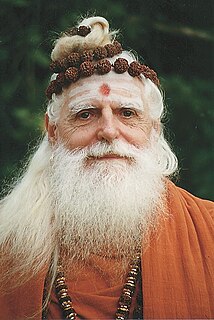 W
WSivaya Subramuniyaswami, also known as Gurudeva by his followers, was born in Oakland, California, and adopted Shaivism as a young man. He was the 162nd head of the Nandinatha Sampradaya's Kailasa Parampara and Guru at Kauai's Hindu Monastery which is a 382-acre (155 ha) temple-monastery complex on Hawaii's Garden Island
 W
WSuhotra Dasa or Suhotra Swami was a Hindu Vaishnava author, philosopher and a leading guru in the International Society of Krishna Consciousness (ISKCON). He was ISKCON's Governing Body Commissioner (GBC), an initiating spiritual master and a sannyasi in ISKCON. He also served as a chairman of the GBC. Since joining ISKCON Suhotra Dasa has spent much of his time lecturing and teaching in Europe, especially in Germany and Eastern European countries. Suhotra Dasa authored several books on Gaudiya Vaishnava philosophy and Vedanta. In his latter years he was twice suspended from the position of guru. He also lost his sannyasi title.
 W
WBhakti Tirtha Swami, previously called John Favors and Toshombe Abdul and also known by the honorific Krishnapada, was a guru and governing body commissioner of the International Society for Krishna Consciousness. He was the highest-ranking African American in ISKCON. Bhakti Tirtha Swami met with figures such as Nelson Mandela and Zambia's president Kenneth Kaunda, was frequently interviewed in the media, wrote 17 books on religious topics and led community development projects in the United States and other countries. He was the founder and director of the Institute for Applied Spiritual Technology in Washington, DC, "a nonprofit, nondenominational organization whose membership represents a variety of spiritual paths and professional backgrounds". He traveled frequently and served as a spiritual consultant. He also served as chairman of the Third World Coalition. On February 7, 2006 the Council of the District of Columbia recognized him for dedication to social change for residents in the District of Columbia.
 W
WBhaktisvarupa Damodara Swami, also known as Dr. Thoudam Damodara Singh and by the honorific Sripada, was a Gaudiya Vaishnava spiritual leader, scientist, writer and poet. In 1971 he received spiritual initiation from A. C. Bhaktivedanta Swami Prabhupada. A few years later he became one of the religious leaders of the International Society for Krishna Consciousness.
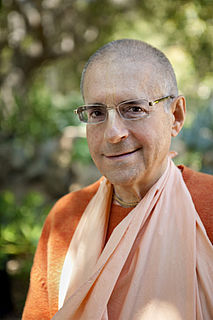 W
WGiriraj Swami is an initiating guru within the International Society for Krishna Consciousness (ISKCON) and one of the leading disciples of A. C. Bhaktivedanta Swami Prabhupada, the founder-acharya of ISKCON.
 W
WBhaktivinoda Thakur ), born Kedarnath Datta, was a Hindu philosopher, guru and spiritual reformer of Gaudiya Vaishnavism who effected its resurgence in India in late 19th and early 20th century and was hailed by contemporary scholars as the most influential Gaudiya Vaishnava leader of his time. He is also credited, along with his son Bhaktisiddhanta Sarasvati, with pioneering the propagation of Gaudiya Vaishnavism in the West and its eventual global spread.
 W
WBal Gangadhar Tilak, born as Keshav Gangadhar Tilak, was an Indian nationalist, teacher, and an independence activist. He was one third of the Lal Bal Pal triumvirate. Tilak was the first leader of the Indian Independence Movement. The British colonial authorities called him "The father of the Indian unrest." He was also conferred with the title of "Lokmanya", which means "accepted by the people ". Mahatma Gandhi called him "The Maker of Modern India".
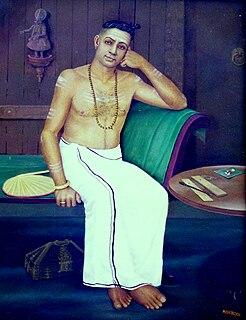 W
WUnnayi Warrier was a poet, writer, scholar, dramatist who lived in Kerala, India during the later part of the 18th century. He is best known for his chef-d'oeuvre Nalacharitham aattakatha and is known to have made significant contributions to the art of Kathakali, the classical dance-drama form of Kerala.
 W
WSwami Vivekananda, born Narendranath Datta, was an Indian Hindu monk. He was a chief disciple of the 19th-century Indian mystic Ramakrishna. He was a key figure in the introduction of the Indian philosophies of Vedanta and Yoga to the Western world, and is credited with raising interfaith awareness, bringing Hinduism to the status of a major world religion during the late 19th century. He was a major force in the revival of Hinduism in India, and contributed to the concept of Indian nationalism as a tool to fight against the British empire in colonial India. Vivekananda founded the Ramakrishna Math and the Ramakrishna Mission. He is perhaps best known for his speech which began with the words "Sisters and brothers of America ...," in which he introduced Hinduism at the Parliament of the World's Religions in Chicago in 1893.
 W
WParamahansa Yogananda was an Indian monk, yogi and guru who introduced millions to the teachings of meditation and Kriya Yoga through his organization Self-Realization Fellowship (SRF) / Yogoda Satsanga Society (YSS) of India, and who lived his last 32 years in America. A chief disciple of the Bengali yoga guru Swami Sri Yukteswar Giri, he was sent by his lineage to spread the teachings of yoga to the West, to prove the unity between Eastern and Western religions and to preach a balance between Western material growth and Indian spirituality. His long-standing influence in the American yoga movement, and especially the yoga culture of Los Angeles, led him to be considered by yoga experts as the "Father of Yoga in the West."